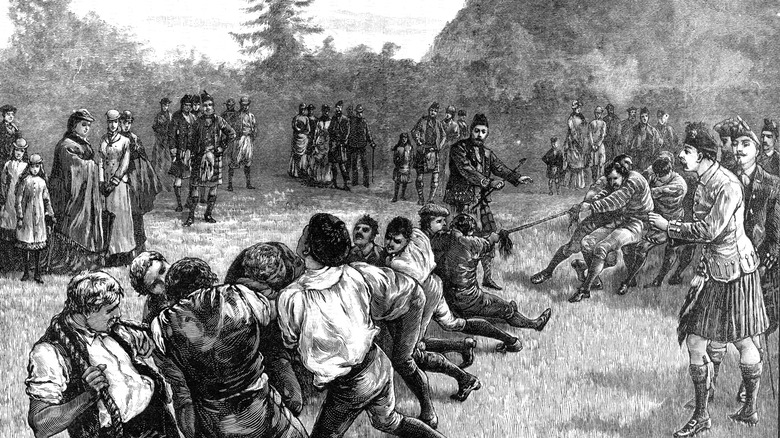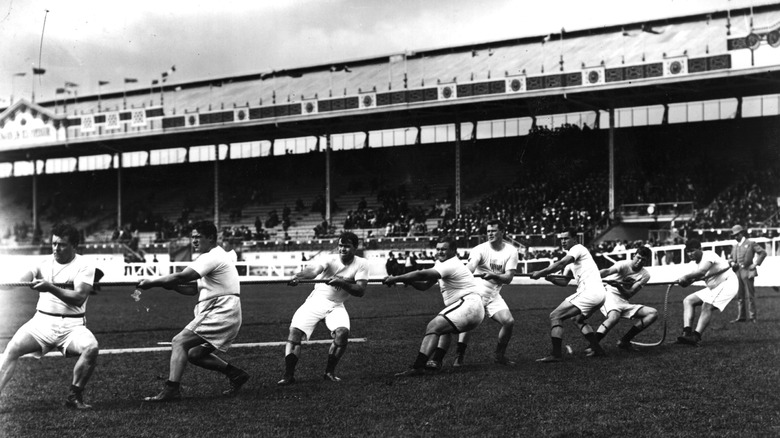The Classic Playground Game That Was Actually Once Part Of The Summer Olympics
The topic of which sports should and shouldn't be in the Olympics always makes for a lively debate. For instance, there's a fair case to be made that maybe equestrian events should be sidelined, or at the very least, the horses should get the medals instead of the person sitting on them, considering it's their hooves doing all of the work (via Fox Sports). Some would argue that any sport with judges should be on the outs. It's not fair that someone can perform the run or routine of their lives, but their Olympic dream can be torpedoed simply because the German judge was having a bad day.
Other sports had their moment in the Olympic sun, only to be told to take a hike in favor of others. Believe it or not, tug of war, the test of brute strength, now most commonly seen in '80s movies about summer camps, was once part of the Olympic program. It didn't just make one appearance either as, according to the Tug of War Association, the event — and the brush-burned hands that accompany it — were a frequent presence in the Olympics of the early 20th century.
The history of tug of war
Where tug of war originated from is up for debate, according to the Tug of War Association, as similar activities have been observed all around the world and across multiple continents. In these instances, two groups of people pulling on a rope or a piece of wood were part of religious ceremonies. Essentially anywhere there was rope and enough people to divvy up into teams, there's a good chance something reminiscent of tug of war was on display.
The ancient Greeks are credited with turning the idea into a strength competition, though sometimes it was used as more of a way for athletes, as well as warriors, to train for other sports than a contest in and of itself, per Sportsmatik. Tug of war continued to spread and increase in popularity in places like 12th-century India. As the years went by, it continued to be a popular pastime.
In 1896, the first modern Olympic Games were held, reviving the ancient Greek tradition, 1,500 years after the games had been banned by Roman Emperor Theodosius I (per History). The first modern games were fittingly hosted in Athens, Greece, and just 13 countries participated. However, tug of war was nowhere to be found on the schedule for the 1896 Games and didn't make its Olympic debut until four years later.
Tug of war at the Olympics
The Olympics ventured out of Greece for the first time with the 1900 Games in Paris, and with them came the highly anticipated (probably) Olympic debut of tug of war. According to the Tug of War Association, the inaugural event was won by Sweden, who took gold by topping the United States. The host nation, France, took the final step of the podium and the bronze medal. Tug of war returned at the 1904 Olympics in St. Louis, Missouri, where the United States managed to sweep the medals in the tug of war competition.
Tug of War was on the bill at the 1908 Games in London, where the hosts swept the medals as the United States had done at the previous Games; the 1912 Games in Stockholm; and finally, the 1920 Games in Antwerp. The final tug of war podium consisted of Great Britain on the top step, followed by the Netherlands, and finally, the host nation, Belgium.
After the 1920 Antwerp Games, the International Olympic Committee was looking to pare down the number of athletes in attendance at the Games, and to do this they cut some sports from the program. One of the casualties from these cuts was, unfortunately or not, tug of war.
The fate of tug of war
According to the Canadian Olympic Committee, one of the reasons the sport wound up on the chopping block had to do with how it generated several controversies, including a 1908 incident where the United States accused the Liverpool Police (who were competing as a team) of cheating by wearing illegal boots. In 1912, the British team caused a stir when they lost the first round to Sweden and then were disqualified when they wouldn't stop sitting down in subsequent rounds.
However, this didn't spell the end of the sports association with the Olympics. According to the Tug of War Association, individual countries started forming their own tug of war governing bodies — Sweden was the first, in 1933. By the 1960s, new, non-Olympic competitions emerged to give these organizations a chance to compete with each other. Tug of War International Federation is recognized by the IOC — which is a requirement for a sport to be included in a future Olympic Games — but tug of war's return to the Olympic program seems highly unlikely,



